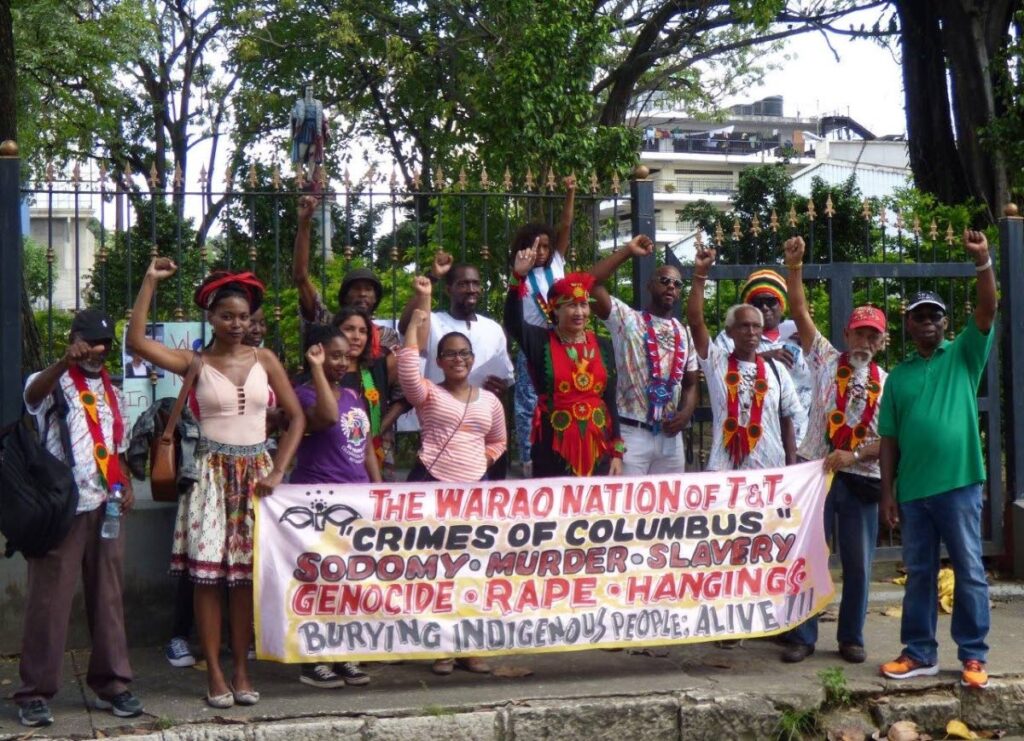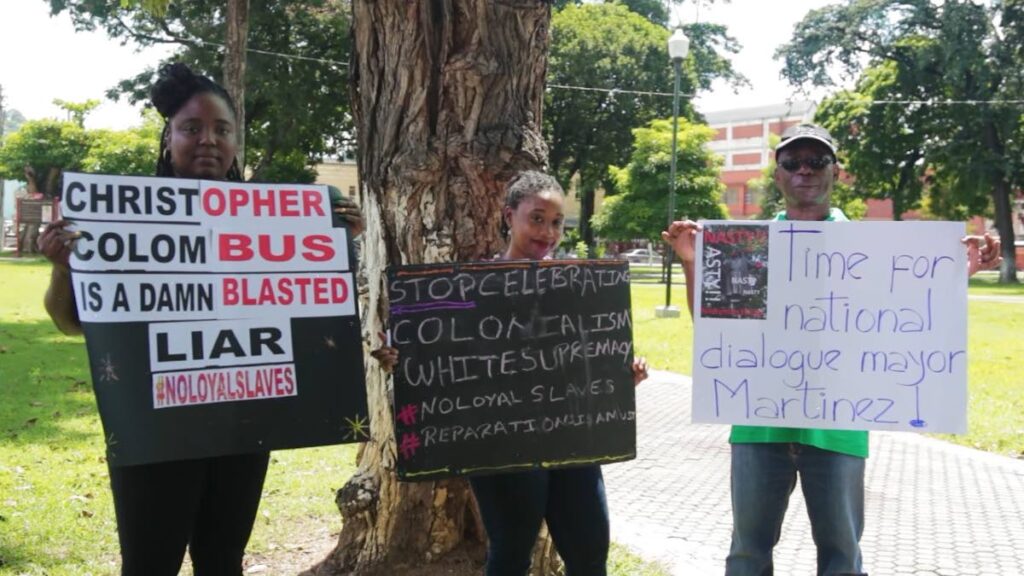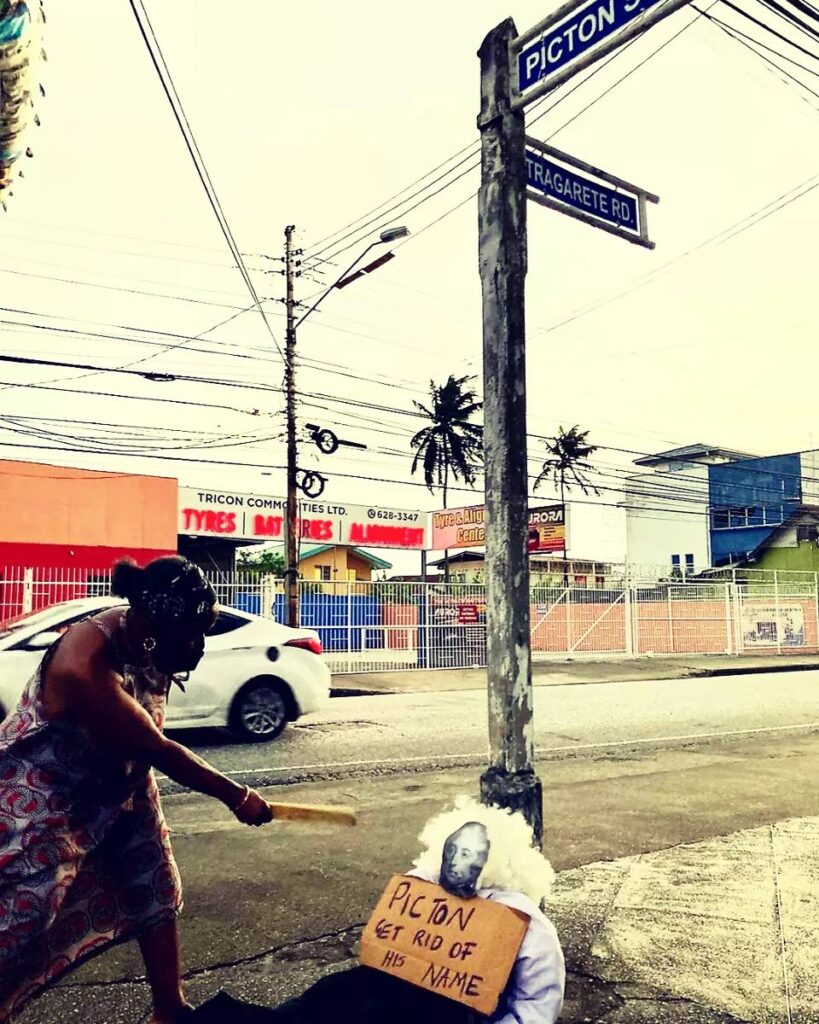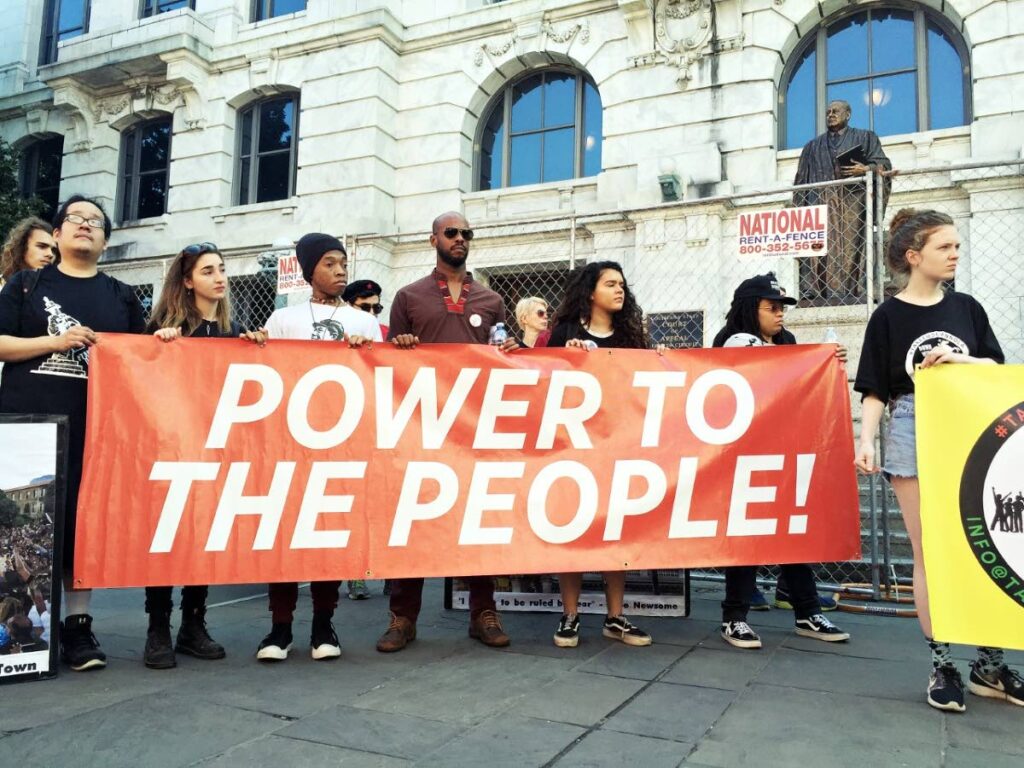Cross Rhodes Freedom Project: Set up commission to examine monuments

As the pandemic wanes, the Cross Rhodes Freedom Project hopes the Government will act on its call for a committee to “identify, destroy, repurpose or reconstitute any monuments, memorials, emblems, signs or symbols or the like that celebrate, commemorate and glorify racism and white supremacy.”
The Cross Rhodes Freedom Project is part of the Caribbean Freedom Project. The name comes from the group's first project, which addressed the legacy of British politician and mining magnate Cecil Rhodes, said to have been the architect of apartheid and a white supremacist.
The project's director, Shabaka Kambon, said the phrase Cross Rhodes was used because Rhodes was a symbol of all of the "colonial monsters" the group planned to address.

Kambon hopes the Government will act before Independence Day and before the National Museum Wales displays the work of Trinidadian artists Gesiye and LakuNeg in its reshaping of the narrative of Lieut-Gen Sir Thomas Picton.
Picton, governor from 1797-1803, was also known as the tyrant of Trinidad or the blood-stained governor, according to https://museum.wales/, despite his earlier reputation as a hero.
Locally the group is known for its work towards removing the name of Viscount Alfred Milner from a hall of residence at UWI's St Augustine Campus; removing the Christopher Columbus statue from Independence Square, Port of Spain; and changes to signage at Lopinot Estate.
Removing Milner's name, says Kambon, "was our first project, although we launched both the Columbus Must Fall, the rename-Milner-Hall and the Lopinot Project at the same time, in June 2017.”
Milner, considered Rhodes' right-hand man, was, said Kambon, one of the godfathers of apartheid in South Africa. He set up the Imperial College of Tropical Agriculture, which became UWI's Faculty of Agriculture, and when he died the hall was named in his honour. It is now Freedom Hall.
Milner was the first to "fall," in 2018, "and then we decided to focus on Columbus and Lopinot at the same time, because we thought we had created the climate to do that.”

By 2021 the group had “the offensive sign” at Lopinot Estate removed. It engendered reverence to the French Compte de Loppinot and described “the slavers as illustrious while demeaning the people whom they trafficked and worked to death as loyal slaves.”
The Cross Rhodes Freedom project described the sign in its No Loyal Slaves campaign as “shamefully misleading, unhistorical and psychologically damaging.” It was removed in January 2021 and the group hopes to have the names of African people who were enslaved on the plantation, as well as Indian indentured labourers there, commemorated on new signs.
“We have presented the authorities with many of the names of people who were enslaved there. We have presented them with an alternative sign that speaks truth to the past. It is a far more truthful rendition of slavery and a whole new narrative, something entirely new that could be done with that space that would make it a truly educational and edifying space for the people of Trinidad and Tobago and visitors to the country as well.”
In 2020, the group delivered a petition to Port of Spain mayor Joel Martinez calling for the Columbus statue’s removal. The council wanted the statue moved to the museum, but Martinez vetoed it, saying the matter was now a national issue, and sought the Government's advice.
The group wrote to the Prime Minister and petitioned Parliament,
"And on July 1, 2020, it was read and approved in the House without a dissenting voice.”

But with the growing threat of the pandemic and an upcoming general election, the issue was put on the back burner.
The group now expects the Government to move forward on the petition, which was signed by prominent members of society, including a descendant of Hippolyte Borde, the wealthy local cocoa planter and merchant who gave the statue to the city in 1880. The statue, which the group felt should have been moved to the national museum, has since been vandalised.
Kambon believes if the Government fails to act swiftly on these colonial monuments, it is going to find itself in an embarrassing situation globally: “Because the world is moving forward. When we launched this project in 2017, it was relatively unheard of."
The group's attempt to start a national dialogue was met with "a great deal of anxiety among the leading public officials. Nobody wanted to touch the subject." Not to do so was shameful, he said.
The current global momentum was why the Government needed to act now, he said.
“Now the whole world is embracing the subject. The countries that sent out these protagonists of all of these great historical crimes, they are removing those people from places of public veneration."
So, he said, a statue of "someone who was a proponent of slavery, genocide, indentureship and apartheid...should clearly be understood by everyone as an affront to the values that we celebrate and publicly proclaim in this country, region and across the world.”
Removing statues and monuments does not change the past, but Kambon said the idea was not to change the past, and not to hide it. He said Caribbean luminaries, including UWI vice chancellor Sir Hilary Beckles, responded to these issues with great clarity.

“When you put up a monument to someone in a prominent place, you name a street after them, you put a statue of them, you name a plaza after them, that is considered, globally, to be an honour...something that is supposed to inspire future generations to want to be like those people."
Kambon said across the world people were beginning to favour the idea – with the Black Lives Matter Movement helping to tip the scale – that all people are full human beings and should be regarded and treated equally.
This relatively new position was also the prerequisite for reparations for slavery.
He cited a media statement last year by Antigua and Barbuda’s ambassador to the Organisation of American States Sir Ronald Saunders, calling out the Spanish Government for its role in promoting Columbus’s “discovery” of the New World.
When Barbados removed a statue of Lord Nelson from its National Heroes Square in 2020, the entire country understood it was one united Barbados that removed Nelson, and Kambon wanted TT to arrive at a similar position.
He said Caribbean people live in a social construct where logic was decided in colonial violence. The work being done is “retracing the outline of that violence to understand the steps that we need to take to liberate ourselves, to unshackle our present and free our future.”
Kambon said this was why the project and its work were so poignant and important.
Asked if he thinks the changes will happen, he said as “a victim of this very same social structure that is underpinned by white supremacy, that we are trying to acknowledge now and address,” Dr Rowley has been constantly dogged by the racism embedded in society.
“I am absolutely certain we are going to get a positive response from our Prime Minister.”
Kambon was confident Rowley would show “civic courage and moral clarity on this issue. And we will have some movement forward now that the country is coming out of lockdown.”
He believes change must happen sooner rather than later.
“The nature of our society, the caste system that exists here, follows the colonial logical of white over brown over black.
"People suffer from that caste system every day. People live and die in poverty. People die younger than they should. We have chronic diseases like diabetes and high blood pressure and so on, reducing our life expectancy.
All this, he said, arose from "our inability to acknowledge the violence of our past and therefore to address the legacy consequences in our present.”
The Cross Rhodes Freedom Project wants to accelerate the process, he said. Next is the petition to Parliament to set up the commission.
“Anything that celebrates racism and white supremacy, anything that is an affront to the avowed stated values of the people of this country has to be looked at carefully.
“We have to rescue our heroes from the dustbin of history. The people who stood up for the rights of our people against these colonial monsters, these are the people we have to celebrate.”
He said the most celebrated colonial icon in TT is Sir Ralph James Woodford, commemorated by Woodford Square, Woodford Street, Woodford Café, a life-sized marble monument in the Anglican Cathedral, and a plaque in the Catholic cathedral.
But he said Woodford was also the most notorious racist and white supremacist in TT’s history.
“He publicly called on whites in this country to be exceedingly harsh with people of colour, and segregated everything from the pews of the churches to the cemeteries. Blacks and whites were never supposed to be equal or to sit together.
“And the work that Woodford did in his reign as the longest-serving colonial governor still affects the people of TT up to today.”
Kambon said Woodford was opposed by Fr Francis de Ridder, the first coloured RC priest in this country, who set up the first desegregated primary school and church, in the time of Woodford. But TT forgot and ignored him.
“The values that he represents we don’t think are worthy to be celebrated publicly. But the man who persecuted him to death, Governor Woodford, the litany of things Woodford did – that man is celebrated over the man who stood up for the values we say we celebrate today.”
The group is also in ongoing meetings with women’s organisations to further develop an educational campaign about Picton's crimes.
In the past colonialism was considered "a nice period. We talk about colonial architecture, colonial food, colonial this…there is a kind of fond, fuzzy feeling."
In fact, he says, "That was a period of apartheid" – a word he says is increasingly being used at the Caricom level – "and we are now coming to acknowledge that and to use the language to acknowledge it. The legacy of that apartheid lives on in our society today and we will become much more specific with our language in the near future as we address the present and the future we want to see.
“We still have to get the authorities to move on the past. But the past is not our objective, it is the present and the future.”

Comments
"Cross Rhodes Freedom Project: Set up commission to examine monuments"